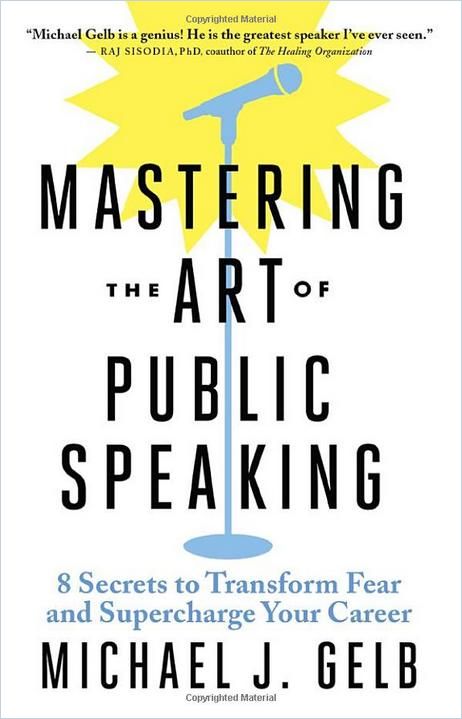Executive coach Michael J. Gelb, a prolific self-help author, offers a basic blueprint for everyone who is fearful of public speaking.

Speak with Confidence
Michael J. Gelb, an executive presentation coach for major international corporations, teaches at the Gabelli School of Business in New York City and at the London Business School. He offers techniques to fuel your comfort and success as a public speaker, and he shows you how to develop the “clarity and presence” essential for quality presentations.
Many authors famous for their public presentations praise Gelb for his, and for condensing his years of successful presentations into this accessible how-to book. Experienced public speakers, however, will find little new or necessary here. Gelb aims at the inexperienced, and those who are approaching public speaking for the first time or with trepidation will value his sound, basic advice.
Positive Energy
The National Institute of Mental Health reports that nearly three-quarters of Americans suffer from glossophobia, or a fear of public speaking.
Fear is your friend. It will keep you sharp and focused as you learn to dance with it instead of letting it bully you.Michael J. Gelb
Glossophobia, Gelb notes, causes people to avoid public speaking. Those afflicted, when they must speak, stand like zombies, grip the podium, stare at the audience in panic and recite their remarks in a rushed monotone. Gelb insists that you can transform your fear into high energy and enthusiastic purpose.
Training the Butterflies
When you control your fear, you focus your thinking, preparation and delivery. Many public speakers, actors and other performers taught themselves to swap fear for focus. They don’t try to banish the butterflies in their stomachs; they organize their butterflies to “fly in formation.” You need this focus because public speaking demands that you be clear and be present.
If you don’t know what you’re talking about or why you’re talking about it, you probably shouldn’t be talking. Michael J. Gelb
Capable presenters have a clear, mindful plan and an awareness of the factors they want to control. Become a student of public speaking and what it entails, Gelb advises. Study what works and what doesn’t. As you enhance your skills, you will put your fears to rest and turn public speaking from a chore to a joy.
Empathetic Goals
To get rid of your nervousness when you speak, get out of your own head. Focus on your audience members. Think about what’s important to them. Put their needs first. Empathize with them. Share information they need to improve their jobs or their lives. Concentrating on empathetic goals helps you forget your uneasiness.
The fear of failure and embarrassment leads people to focus inordinately on themselves instead of on the audience. Michael J. Gelb
Help your audience understand and remember the information you offer. Gelb suggests the “PROPAR” approach to make your content memorable. This consists of the Primacy of your first impression; Repetition to drive home your points; Outstandingness in the form of unusual ideas your audience will retain; Personal Association, because the more relevant your information, the more likely people are to remember it; and Recency, which stresses that people recall best what they heard most recently. This acronym seems slightly ridiculous; Gelb would do better to simply state what he advises and leave PROPAR to the side.
The words you choose define you, so select them carefully and use them precisely. Avoid hackneyed phrases or clichés. Your efforts to be original will pay off in greater audience engagement.
Gelb is adamant, as is every public speaking adviser, on avoiding saying “uh, like” and “you know.” Don’t indulge in jargon unless everyone in the audience knows what your specialized vocabulary means.
The author reminds you to heed your posture, hand movements, eye contact and tone of voice. Like your words, these elements communicate important information to the audience. Smile, breathe, and relax your eyes, shoulders and jaw.
Learn to relate positively to your audience. Establish your authority. If you can, arrange for a respected or authoritative individual to introduce you, which builds your credibility.
Practice
Ask trusted friends or mentors to evaluate your presentations and to offer constructive criticism.
Gelb recommends practice, practice and more practice. He suggests rehearsing until you have confidence in yourself and in your material. This may require a few hours or a few days. When presenting to your company’s senior executives, be respectful and speak with authority. Prove yourself worthy of their time and attention.
One always speaks badly when one has nothing to say. Voltaire
Avoid speaking in a monotone or speaking for too long. Learn to read your audience, so you’ll know when they are on your side. Be respectful of all questions and questioners. If you don’t know an answer, say so. Promise to get back to the questioner when you know the answer, or ask your audience if anyone present knows the answer.
If you have a gift for humor – and not everyone does – lighten the mood with a joke that you know will get laughs. Make sure it relates to your presentation.
When giving a virtual presentation, deal with your visuals in advance and remember that you will have more difficulty reading an online or on-video audience. Speak with confidence and pay particular attention to your body language.
Do Good
The author, a fifth-degree aikido black belt and tai chi and qigong expert, once waited on a prayer cushion for a great sensei to share his wisdom and insight. The meditation master entered the room, studied his audience and said, “Don’t do bad, do good.” He bowed and left. Gelb learned an important lesson: Make your presentation ethical and speak to your purpose.
The Basics
Gelb’s specialty is not public speaking; it’s writing brief, straightforward beginner-level books – and many of them – that aim to help you develop positivity in a variety of contexts. He is neither an original thinker nor writer, and here he offers few revelatory insights or approaches that you would not likely think of yourself. Yet his prose is easy to read, and his ideas are so basic that they’re pretty easy to put into practice.
The one easy way to become worth 50% more than you are now – at least – is to hone your communication skills – both written and verbal.Warren Buffett
This work is for young people first approaching public speaking or for adult beginners so terrified of the act that they need a short manual of the fundamentals.
Michael J. Gelb’s other books include How to Think Like Leonardo da Vinci, Body Learning, Brain Power, The Art of Connection, Discover Your Genius and Creativity on Demand.




